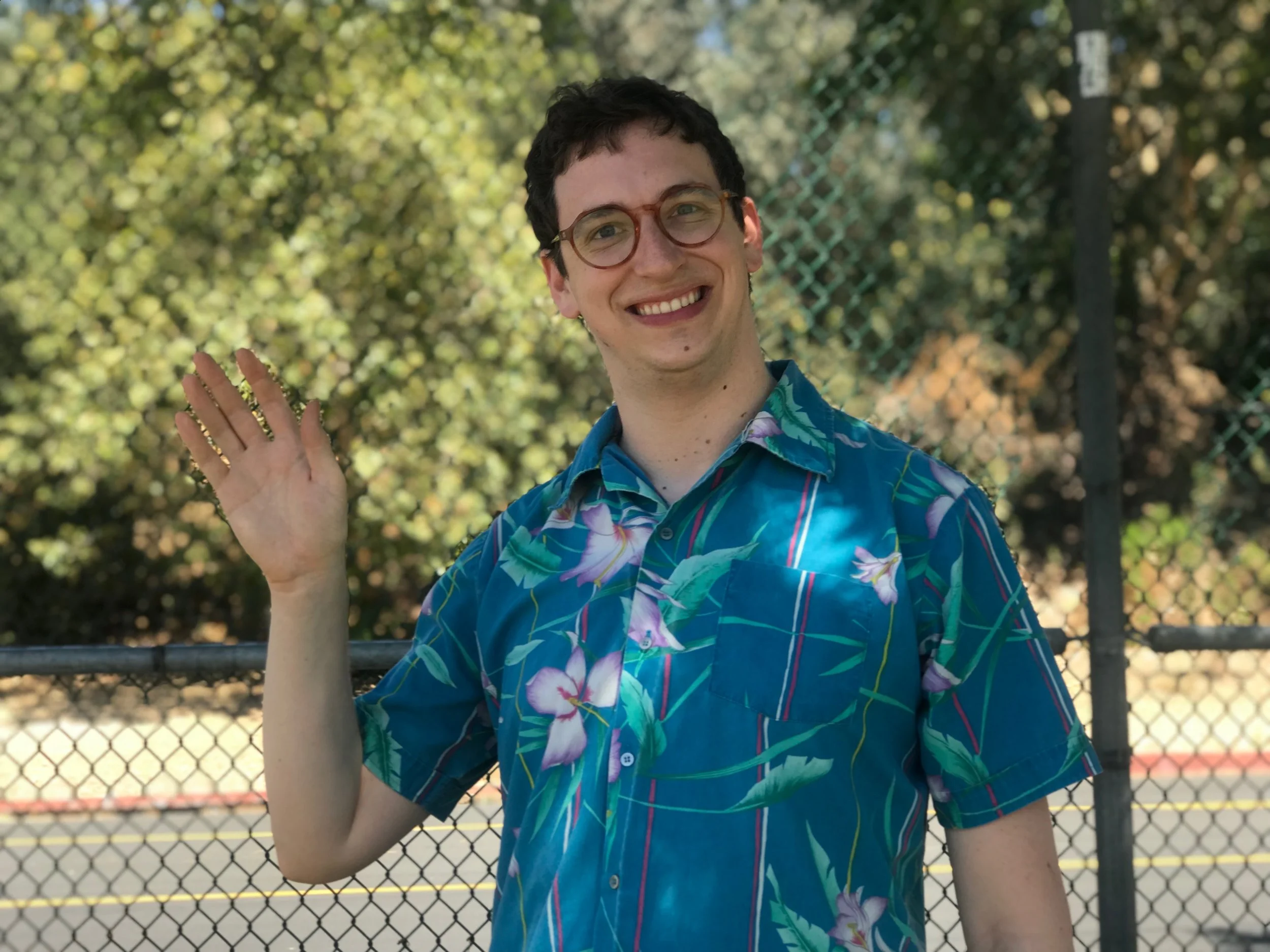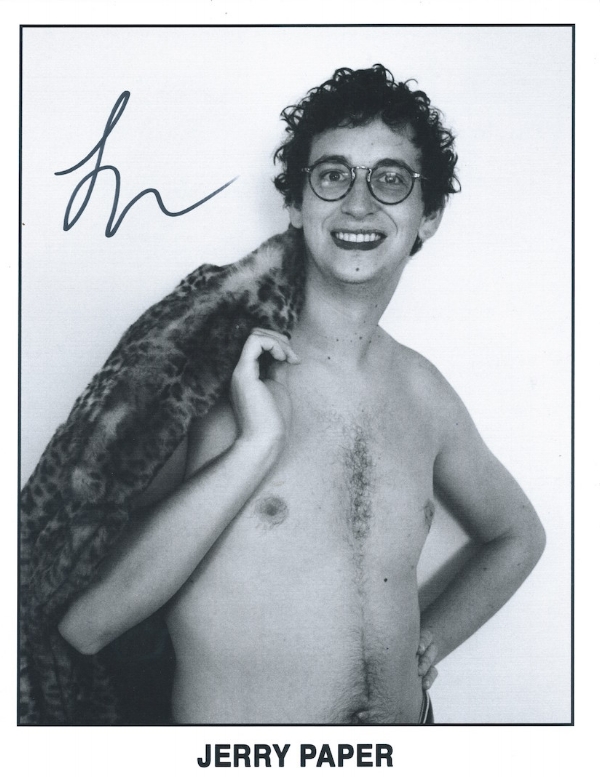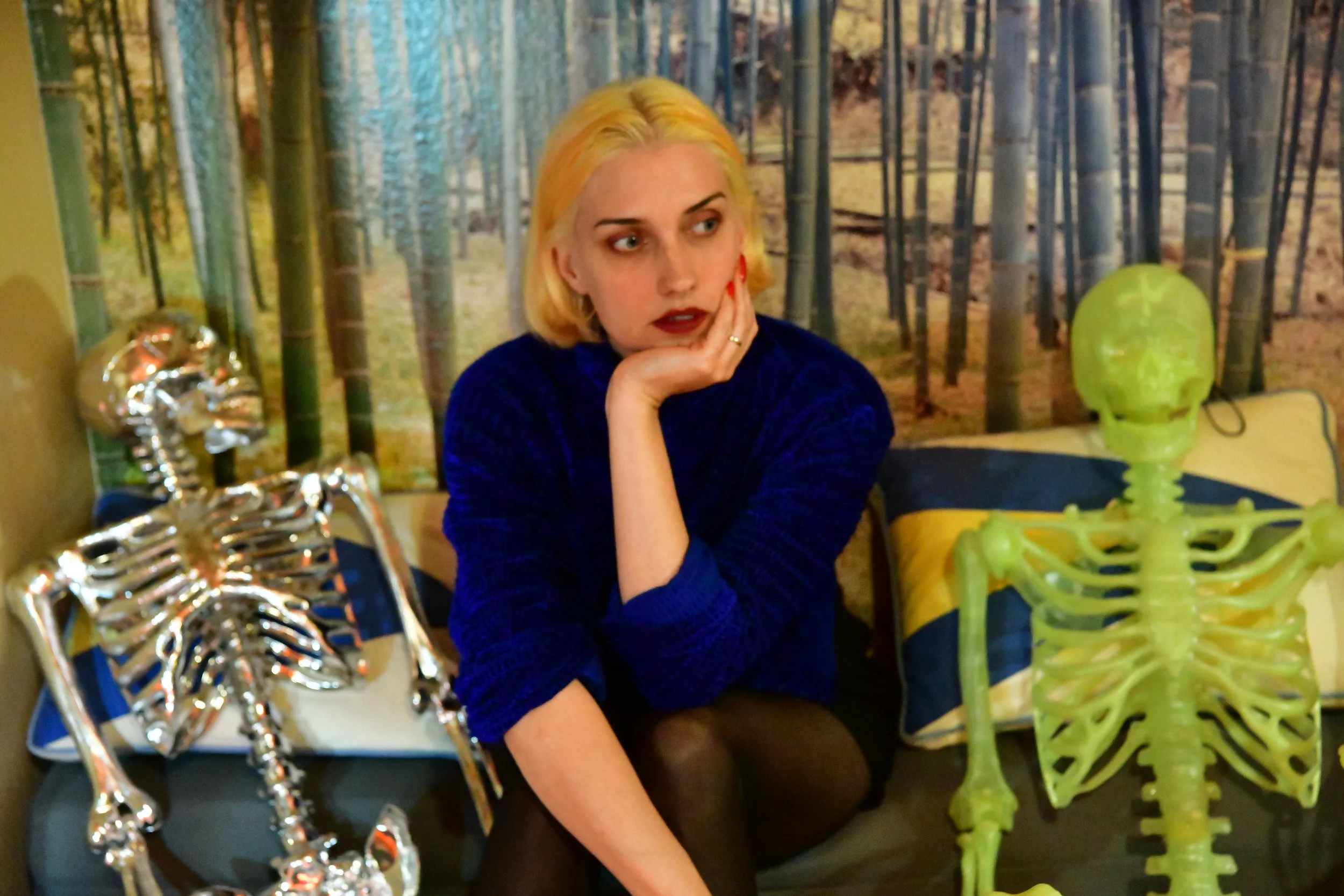Jerry Paper Talks Philosophy, the Self, and New Single "Your Cocoon"
Jerry Paper has become one of our favorite artists here at WMF. Besides remarkable albums like Big Pop for Chameleon World and Carousel, Jerry Paper has a well-deserved reputation as a must-see live act, and his performance at Desert Daze last October was absolutely one of the festival's highlights. With new single "Your Cocoon" out now on Stones Throw we were eager to sit down with Jerry Paper and discuss the background to the track, recent collaborations, his recording process, philosophy, and more.
Bobby Weirdo: I really like the new single “Your Cocoon” and am excited about the upcoming album. Jerry Paper seems to be a good fit with Stones Throw, and I’ve been wondering how that connection came about.
Jerry Paper: Well, I’ve been working on the album for a couple years. It took a long time to come together the way I wanted it to – much longer than everything else I’ve done. It was emotionally straining and an intense thing to make. So when I was finally almost done with it, I wanted it to have a good home. I talked with my friend Alex [Brettin] who does Mild High Club and asked if he could pass it along to Stones Throw.
I’ve never felt that my music has fit anywhere before. It just doesn’t seem to fit comfortably under most labels, but I didn’t feel like it would be productive to put [this album] out myself. I wouldn’t be able to reach the audience I want, and there are logistical things I don’t want to deal with. I’ve always loved Stones Throw and thought of them as a home for people who don’t have a home. There’s no one sound, so that was my first choice. I asked Alex, he sent it to Peanut Butter Wolf, and we got to talking.
BW: “Your Cocoon” sounds more band-like than some previous Jerry Paper releases.
JP: The last record was pretty band-like.
BW: It sounds like an extension of that…
JP: It’s definitely an extension of that. I always change a lot. I think you can tell from all my albums that I don’t like to stick with one thing for too long. If I know what the process is, then I don’t feel like it will yield something that’s interesting to me. And if it’s not interesting to me, why would it be interesting to anyone else?
So for this one, the process was an expansion on how I did the last one. The last one was me trying to do something different from my typical sit-down-with-synth-and-drum-machine method and challenge myself. I did a bunch of guitar demos and some synth demos, but basically very spare things that I didn’t know what to do with. I ended up going to Toronto and expanded those ideas with the BadBadNotGood guys for a nine-day marathon recording session.
This one was a bit more planned with fleshed-out demos. I had the other album all in my head, but hadn’t executed it [before the studio sessions]. The demos [this time] changed a lot during the recording process, but it was mostly me and Matty [Tavares] from BadBadNotGood, this time for twelve days – just bringing everything to life. And I also spent a couple months overdubbing and mixing at my house after the Toronto sessions.
BW: On the upcoming album then, what was the breakdown of studio recording time vs. home time?
JP: For writing the album, home time was a year and a half going crazy and trying to make what I wanted. Studio time was twelve days there in Toronto. There were a few people coming in and out, and their contributions were invaluable, but Matty and I were the core in terms of producing the record and playing the instruments. There were a few things we didn’t get to, and it was a super intense experience. It always is, but [this time] was really, really intense emotionally and on a lot of different levels.
I really feel like this is the most fully realized of anything [I’ve done]. Out of everything I’ve ever made, this [album] sounds the most like what it sounds like in my head. Everything else has been what it sounds like in my head butting up against the limitations I’ve had set by me or by the world around me.
BW: Was the intense emotion something you brought with you into the studio, or was it something about the recording experience?
JP: I don’t know. Both?
BW: Conceptually – and I’m thinking about songs and videos from Big Pop for Chameleon as examples -- are ideas about sound and what is real vs. unreal part of Jerry Paper’s universe?
JP: Definitely. And especially those two records -- Big Pop and Carousel -- use a lot of “fake” sounds. It came from a lot of different places; there are many explanations for the same thing. One of the explanations is that I was having experiences in the DMT realm where I was rubbing up against realities that felt just as real as my real experience here. I got to thinking a lot about how our brains create our realities. It’s just raw sense data that’s being pulled in from my nerves, my eyes, my mouth, and my ears. That raw sense data is then jammed in my brain, and the brain builds an interconnected reality that’s a cohesive, multi-sensory, holographic experience.
It just got me really interested in the blurred lines between what we talk about as reality -- which are the worlds that are created from the sense data in our brains --and what is actually reality. It’s kind of a convoluted philosophical argument that’s been rehashed forever. Philosophy is basically people thinking way too hard about things that everyone takes for granted. At that time in my life, that felt like a very important thing to investigate.
That kind of coincided with me being around a lot of noise music and thinking about how funny noise music is. It’s often made up of the same sounds -- loud distortion, screaming, and that’s it. [I was thinking] about how one-note that is, and how a lot of time it doesn’t even sound threatening or disturbing because the sounds are so canonical at this point. So I was thinking about what sounds actually can make you feel bad, like shitty reproductions of actual sounds – and the uncanny valley thing.
BW: What is the uncanny valley?
JP: I don’t know the details, but there’s a graph that shows that the more human something looks, the cuter it is. And then as soon as you get pretty close to almost human, there’s a dip called the uncanny valley, where it looks terrifying. People have a visceral reaction to it, and lot of 3-D animation does that to people. So I was thinking of that in terms of how people hate fake sounds – it just sounds dumb as hell. Simply, I was trying to make good music with bad sounds.
It’s a combination of those ideas that all seem related to me. The way that I approach everything is that I’ll have an idea, and then a bunch of other ideas, and then because of where I am in my life, I see them as connected. I bring them together in whatever I’m working on at the moment, and the connective thread ends up being the through-line of an album.
What I was initially trying to do on the record that’s coming out – but quickly learned it was impossible for me to do well – was to make a concept album about living inside a mall. I moved to L.A. and was spending a lot more time in malls than I ever did in New York. I realized what self-sufficient environments they are, and was thinking about living in – and never leaving – a mall, where all of your experiences are dictated by commerce-related interactions. There’s a really good book called Debt: The First 5,000 Years, by David Graeber. Have you heard of it?
BW: No.
JP: It’s a history of the concept of debt in the past five thousand years, and the idea of owing someone, how commerce relationships are central to a lot of the ways that we think, and how invalid that mode of thinking is for so many of the situations that we apply it to. That’s one small part of a larger, more complex book, which is really good and I highly recommend it. So I read that and was thinking a lot about it and spending a lot of time in malls trying to go through the whole thing. Then, of course, Trump was elected right in the middle of writing and there were a lot of apocalyptic things happening that led to what this album ended up being. It’s essentially a series of vignettes of a world very much like our own.
BW: Is the idea of the cocoon in “Your Cocoon” related to that, or is that separate?
JP: A lot of the people who like my music are young. And young people are ensconced in their ego because their entire teenage-hood is spent building it. In teenage-hood you’re building a personality, trying things out, and fitting your capital “S” Self into what you believe it is.
I think it’s worthwhile to spend the rest of your life dismantling that, and trying to get rid of it – not placing such importance on your opinions and the things that you like. So that’s kind of what that song is about. It’s about being closed off and thinking that your identity has been solved, there’s no more place to grow. The song is ultimately just a character imploring another character to accept the amorphous nature of being a person in the world. It’s kind of a mission statement for the Jerry Paper project. There’s some shopping imagery and it takes place in a mall, so there’s a lot of things going on in that song. But ultimately, the cocoon is the Self.
BW: Speaking of dismantling opinions and the Self you’ve created, is that the beginning of Jerry Paper? You’ve mentioned, for instance, that you didn’t like certain kinds of music, and that’s exactly why you tried making that kind of music. The idea being, if I understand it correctly, that it would be interesting to see where that would take you creatively.
JP: Yes – I started making music kind of under the name Jerry Paper -- but once removed-- when I was twenty. It all started because I was a snobby little teen trying to push the limits of what I thought was good. It’s easy to talk about as if it was a conscious thing, but it was really just a bi-product of my life and it happened naturally.
BW: What informs the harmonic vocabulary you use in your songwriting? There are definitely some more sophisticated chords going on in Jerry Paper songs.
JP: I don’t know – just my ears. I don’t have a music theory background. I know enough to get by and to tell my band what to do. I took bass lessons in high school. I play a chord, and if it sounds boring I see what happens if I move a note and add another. It all comes from experimenting, figuring it out. I’ll be hanging out with people who know musical language…they’ll be like, “What the fuck kind of chord are you doing there?” I’ll say I don’t know, they’ll tell me it’s some complex something or other. Then I know what to call it, but I don’t fully understand it. I just like the sounds.
BW: You did some production work with Kari Faux. Was that collaboration a one-off, or will you be doing more production work like that?
JP: Yeah, I’ve been working on some more stuff with her.
BW: There’s a signature Jerry Paper doubled-vocal sound. How did you come up with that?
JP: It’s just me layering my voice – it’s pretty much because I didn’t know how to record vocals when I started making music at home and that was the only way I could get it to sound good. I think it sounds better on the new record. I’m pretty sure it sounds better.
BW: What is your take on the recorded vs. live experience? Your live band is amazing. It’s coming at the material from just a slightly different angle – almost like a really tight funk/r ‘n b unit, and really nailing it, but as a listener you feel like you’re hearing faithful versions of Jerry Paper songs.
JP: Yeah – I like the Grateful Dead, I like jazz…I like when music is able to transform and maintain its essence. I saw Steely Dan at the Forum about a month ago, and it was the perfect performance. They were the songs that I know and love, but there were really fucking good solos. And they weren’t just the same solos from the record; everything was a little bit different. I don’t want to just see a band do the songs the same way they are on the record; I want to see an interpretation. I want to see something different and feel that the band is interested in what they’re doing, channeling something of themselves Now into music that isn’t necessarily of Now.
For me, performing is a liberating experience. If the audience is right, if the vibe is right, and everything is working in the perfect way for a fraction of a second or maybe even a couple seconds, I’ll have an out-of-body experience and I won’t exist anymore. I don’t stick to a lot of the melodies when I’m singing, and sometimes I have to just go with it…I’m in a trance state and it feels so good. I’m able to do that, and I’m trying to get people in the audience to do that with me. I feel like it’s the most freeing feeling ever, and if I can help people get there it would be great. I don’t know if I’m successful, but I would love to help.
I was doing a solo project for a long time – five years, but in my short lifetime that feels like a long time. It gradually changed from me building all the songs with keys and a looper pedal, to me just using a looper pedal and playing lead lines, to me just using a looper pedal, to me just using a looper pedal and a headset mic so I didn’t have to think about where my head was and could just be as free as possible. I realized that the more free I am, the more people respond, and I’m able to get the message across of wanting people to be free themselves. I try to wear the most comfortable clothes and let myself go.
BW: Besides the upcoming album, is there anything else going on in the Jerry Paper universe?
JP: I just did the music for my friend’s TV show, Dayworld. It’s a pilot that didn’t get picked up but still aired. I’m really proud of it. I love the people I worked with, and I loved working on it. I’m just glad to have been a part of it.







